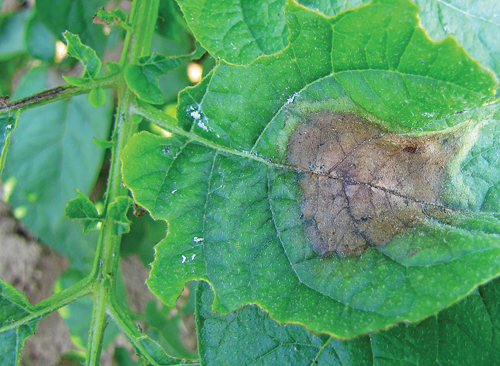Late blight detected on North Fork, researchers hope to contain it

The plant disease responsible for the Irish potato famine has struck a Riverhead potato farm, but researchers are hoping to contain the disease, known as late blight, to avoid a repeat of last year’s disastrous growing season for tomatoes and potatoes.
The strain of late blight found May 29 in Riverhead is identical to that which hit tomatoes especially hard last year, said Dr. Meg McGrath, a researcher with Cornell University’s Department of Plant Pathology, who is based at the Long Island Horticultural Research and Extension Center in Riverhead.
Dr. McGrath is urging home gardeners growing tomatoes and potatoes, the only crops affected by late blight, to look out for the early warning signs of the disease and call Cornell Cooperative Extension’s Riverhead headquarters at 727-7850 to have their plants tested before the blight spreads to other gardens.
Once there are visible signs of late blight the plant must be destroyed to keep the spores from becoming airborne and affecting other plants, Dr. McGrath said.
Late blight begins with large, irregular greenish-gray spots on leaves, which turn brown and begin to develop a white mold on the underside. In later stages of the disease, large brown areas appear on the stems and the fruit begins to rot.
“I was hoping we’d kind of escape this disease this summer, but that was wishful thinking,” said Dr. McGrath. “We went for years without it being a disease of any concern. If it’s detected early and people act, it can be stopped. But if we don’t detect it until it’s really severe, it can’t be stopped.”
Dr. McGrath said that’s likely what happened last year, when late-stage late blight was found in a garden in Sagaponack near the end of June. Researchers estimated that by the time it was discovered, the plants had probably had the disease for about three weeks and the spores had spread throughout eastern Long Island.
In contrast, in 2010, a Setauket farmer noticed late blight early, called Cornell to have his field analyzed and destroyed the crop before it could spread. That was the only case of late blight on Long Island that year.
Dr. McGrath said the Riverhead potato farmer caught the blight early this year, but with so many gardeners beginning to plant vegetables, it’s imperative that even the backyard gardener be vigilant about monitoring crops.
“You can’t not manage it. It’s not an option,” she said. “You end up being a Typhoid Mary and it spreads. It’s an extremely contagious, explosive disease.”
Commercial growers have already begun to spray fungicides to keep their tomatoes and potatoes safe, but chemical treatment is a costly measure that is causing farmers to question whether it makes economic sense to grow those two vegetables.
“You can spray fungicides all summer to protect plants, or grow something else,” she said. “Peppers and eggplants aren’t susceptible.”
She said home gardeners can buy chlorothalonil or copper fungicides to protect their tomatoes, but she urged them to read the labels and apply the fungicides properly. They’ll only work if sprayed before the plant is infected. Even then, she said, home gardeners are at a disadvantage over commercial growers.
“The analogy is someone who is a conventional farmer has access to better fungicides than the home gardener,” she said. “They can fight late blight with prescription medicine and the rest of us are using over-the-counter.”
Dr. McGrath added that even if the blight gets out of hand and home gardeners are certain they have late blight and destroy their plants, it’s important for research purposes for gardeners to bring samples to the lab to analyze which strain of the disease they have.
“If we find out we have multiple strains, we know we have multiple sources,” she said.
The only way late blight can overwinter in the soil is in potato tubers left in the ground. For that reason, Dr. McGrath urges home gardeners not to plant potatoes.
Cornell and two seed companies — Johnny’s Selected Seeds and Bejo Seeds — are working on developing late blight-resistant tomatoes.
“There’s absolutely hope. It doesn’t mean we sit back and get complacent,” she said. “We need to tame this beast.”








